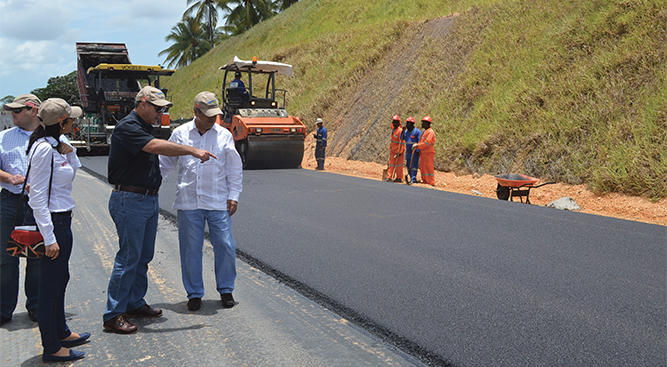Improving infrastructure is crucial for the Dominican Republic, where until recently the roads between many of the country’s popular resorts and its capital, Santo Domingo, were so poor that a simple day trip from one to the other was a big challenge.
More from this report
- Why the Dominican Republic remains well grounded
- Dominican Republic finance minister aims for stability and prosperity
- How SMEs are powering the Dominican Republic banking sector
- Dominican Republic tourism minister plays the numbers game
- Storms leave Dominican Republic’s investment potential undamaged
This has now changed thanks to an expensive plan that has already remodelled the connections in the east part of the country. Visitors and locals can now reach the different coastal resorts, towns and historical sites more easily. An improved road network links Boca Chica, outside Santo Domingo in the south east of the country, to the famous Punta Cana, at the far eastern end, all the way up to Miches and Sabana de la Mar around the coast. Meanwhile, internal routes are also being completed.
Paving the way
Infrastructure and the construction sector in general are making the Dominican Republic more efficient, as well as offering fresh investment opportunities. Transport improvements have already attracted some foreign investors, according to public works minister Gonzalo Castillo. “Some of those roads were a request by investors,” he says. “When they saw we [had] committed to doing them, they made the investments.”
Between 2012 and 2017, the government has spent a total of 82bn pesos ($1.7bn) to build or maintain roads that stretch across 12,057 kilometres. After completion in the popular tourism area in the east, there are plans to upgrade other parts of the country.
A bigger effort is needed to keep the country on its development path, says Mr Castillo. A former businessman, he believes the necessary funds should come from the private sector. He is keen, however, that deals are structured in a way that benefits all parties – something that did not necessarily happen in the past, he says.
“We will need another $200m or $300m in public-private partnerships [PPPs] a year to keep this level of development,” adds Mr Castillo. “I believe in the private sector; it is the one that can create wealth. The government should only support those investments. But if we are going to do a deal, it has to be good for both of us, for the private sector and for the country.”
When looking at potential investments, however, both local and international investors have demanded that the government steps in to supplement returns, should these fall below planned levels, according to Mr Castillo. “I’ve received some investment groups from Colombia, Canada, China, Spain and Germany. The common point is that everyone wants to invest but they want the government to guarantee the investment, [which is] the old model. The way we used to do business was a disaster,” he says.
Worth the risk?
Some investors might be reticent to bid for infrastructure concessions if they perceive risk is insufficiently unaccounted for but a new PPP law, due to come to life later in 2017 or early next year, will offer a clearer and solid framework for all, according to Mr Castillo.
And there are other tools that should appease worries over the government commitment to long-term projects, such as the use of trusts. In Anglo-Saxon jurisdictions, these tend to be a family wealth management tool, but in the Dominican Republic, trusts are used to develop construction projects.
In this case, they function as special purpose vehicles, which are administered by a third party, the trustee. This eliminates doubts over whether the government or a construction company will keep its commitment and allows enough flexibility to determine methods of payments between the parties, says Christian A Molina, general manager of Fiduciaria Reservas, a trusts administrator that is part of Banreservas.
Indeed, the Dominican Republic’s first and only PPP used trusts. Launched in 2014, the project brought public and public sector together for the construction of a new city in the eastern part of Santo Domingo, Ciudad Juan Bosch. It was, says Mr Molina, “probably the most ambitious development project in the Dominican Republic”.
Fiduciaria Reservas set up the government trust that manages the sale of Ciudad Juan Bosch land to private sector construction companies. The government provides the land as an equity contribution in the trust and sells it at a relatively small profit while committing to create the new city infrastructure such as water supply, roads and schools.
The structure gives private sector developers higher legal guarantees on those commitments – in other words, the government can't change its mind on the development plan. The developers in turn, will sell low-income housing through their own trusts, which enjoy a favourable tax regime, while homeowners buying from a trust also receive governmental subsidies.
Building priorities
Infrastructure and the real estate sector are leading priorities in the Dominican Republic. “In the last few years, the government has been involved in the construction of many schools, throughout the country, and hospitals; [this] has contributed to [economic] growth,” says finance minister Donald Guerrero Ortiz. “[With Ciudad Juan Bosch] instead of the government putting in all the investment, the private sector brings its expertise and builds decent houses available to low-income families.” He says a similar development north of Santo Domingo is already in the pipeline.
The country’s largest developer of low-income houses, Constructora Bisono, has a big interest in Ciudad Juan Bosch, and its founder and CEO, Rafael Bisono, is delighted by the incentives provided by trusts. Another supporter is Evelyn Chavez-Bonetti, chair of Fiducorp, a trust with 6000 units in the project. As of 2016, a total of 60,000 units had been built or planned through trusts in the country, says Mr Molina.
This structure should also assuage investors’ potential concerns over the government’s management of the transport network, according to Mr Castillo. Fideicomiso RD Vial, a trust that manages the funds raised through toll roads, is a good example.
Its aim is to ensure those funds are channelled towards projects in a more coherent manner to ensure wider oversight over them. “When I arrived at the ministry, the money from the tolls used to go to a checking account and the minister decided what to do with it,” says Mr Castillo. “We created a trust that administers that money [where the trust’s] president is the finance minister, the vice-president is the economy ministry, as the minister of public works I’m the secretary, and the CEO of Banreservas is a member of that board. And that board decides what to do, which road to build to benefit the country.”
This structure has not only reinforced government’s procedures, but has also helped raise additional funds. In December 2016, Fideicomiso RD Vial issued a 2.5bn pesos 10-year bond, the first of its kind. Mr Molina says the issuance of project bonds is an example of the confidence in this tool – the bond was sold to both local pension funds and retail investors – and its capacity to serve the public interest.
“By earmarking these cashflows [the tolls], the trust can enter into various forms of financing to accelerate the construction of projects: bank loans but also public issuances,” he says.
AML focus
Meanwhile, the Dominican Republic is revising rules to comply with the international anti-money laundering standards of the Financial Action Task Force of Latin America (known locally as Gafilat). Experts says these will lead to more in-depth know your customers practices, which eventually will expand from financial services to other sectors and are likely to put limits on cash transactions. “Real estate is one of the sectors that will be most regulated by the [new] anti-money laundering rules,” says Ms Chavez-Bonetti.
Mr Castillo is confident this will be a change for the better. He is also proud of not needing to tap credit lines for future developments. “This year, 2017, this is the first budget for me, for my ministry, that doesn’t [require] financing. The budget that we’re presenting for 2018 doesn’t have any financing either, it’s all local money: from the government, from taxes,” he says.
This partly reassures him he can tap international credit lines in the future if necessary, should potential investors still require those guarantees on returns before they participate in PPP projects. “It’s easier to borrow money from the Inter-American Development Bank or the International Monetary Fund than [granting the private sector those terms]," says Mr Castillo.
His biggest challenge as he joined public life, he says, was to change the mindset of civil servants, to motivate staff and create a culture of service – something he continues to work on. But he firmly believes the Dominican Republic’s opportunities and legal framework will eventually inspire investors with confidence.













